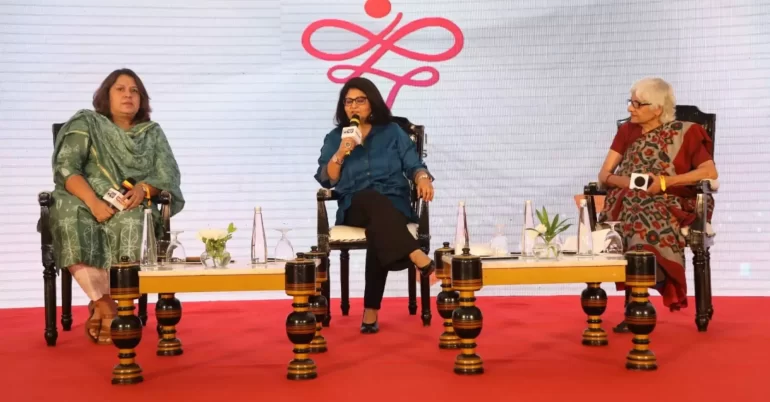At the “We Women Want Festival & Awards 2024”, a panel discussion titled “Women in Politics” featured Congress spokesperson Supriya Shrinate and political analyst Neerja Chowdhury.
The discussion, moderated by Priya Sehgal, explored the historical journey of women in Indian politics, their leadership roles, the challenges they face, and the persistent gender biases within political parties, particularly Congress. Both panelists highlighted the progress women have made over the years, while also acknowledging the systemic obstacles that continue to hinder their full participation.
Discussion Highlights:
Praise for Sonia Gandhi’s Leadership
Supriya Shrinate expressed her admiration for Sonia Gandhi, particularly for her leadership during the United Progressive Alliance (UPA) years. She described Gandhi as empathetic and graceful, underscoring her significant role in shaping crucial reforms alongside Dr. Manmohan Singh. Supriya noted that her personal interactions with Gandhi enhanced her respect for the Congress leader, particularly appreciating her sense of humor which added a unique charm to her leadership style.
Supriya also contrasted her connection with Sonia Gandhi to ‘Indira Gandhi’, recognizing that many in her generation, including herself, did not experience Indira Gandhi’s era firsthand, making Sonia’s influence more personal and impactful.
Historical Overview of Women in Politics
Neerja Chowdhury provided a historical context regarding women’s political engagement in India, tracing back to the freedom struggle. She emphasized that Indian women gained voting rights earlier than their Western counterparts. “Indian women had a head start,” she stated, citing Mahatma Gandhi’s appointment of ‘Sarojini Naidu’ as Congress president in 1924, despite the literacy rates among women being only 1% at the time.
However, Neerja highlighted that women have often been sidelined in post-independence politics. In the first Lok Sabha, only 5.4% of members were women, a figure that has increased to 13.4% today. While progress has been made, it remains insufficient for achieving gender parity. She pointed out that women in politics are frequently judged by different standards than men, where competence is often overshadowed by perceptions of morality or family background.
Priyanka Gandhi’s Political Position
A significant focus of the discussion was on Priyanka Gandhi’s role within the Congress party. Neerja questioned why Priyanka was not given a seat to contest in Uttar Pradesh, particularly in the Congress strongholds of ‘Amethi’ and ‘Raebareli’. She argued that Priyanka’s exclusion from these constituencies reflects deeper biases within the Congress party that hinder the rise of prominent women leaders.
Supriya defended the party’s strategy, stating that Priyanka’s national campaigning was prioritized over contesting a single seat. “We did not want to fall into the trap of the BJP,” Supriya explained, arguing that restricting Priyanka to one constituency would limit her effectiveness across multiple states. She expressed hope that Priyanka Gandhi would soon find her place in Parliament, where her assertiveness and leadership could make a greater impact.



Leave A Comment